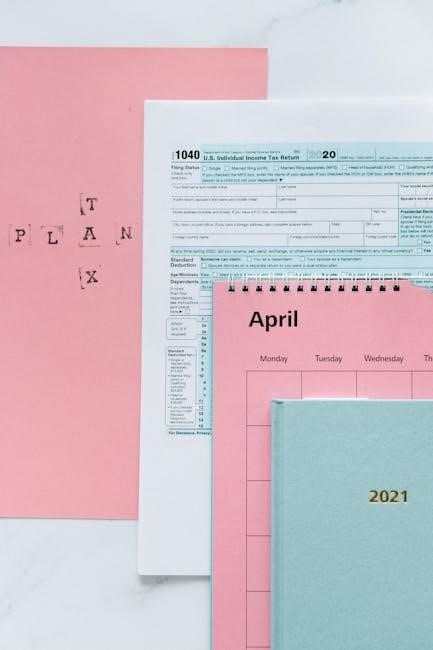Year 1 Maths Worksheets PDF offers engaging, printable activities aligned with the UK National Curriculum, providing essential maths skills practice for 5-6 year olds at home or in the classroom.
What Are Year 1 Maths Worksheets?
Year 1 Maths Worksheets are educational resources designed to help children aged 5-6 develop foundational maths skills. These worksheets are typically in PDF format, making them easy to print and use at home or in the classroom. They cover essential topics such as addition, subtraction, counting, shapes, and basic number skills, aligning with the UK National Curriculum. The activities are engaging and age-appropriate, often featuring colourful designs, dot-to-dot exercises, and number lines to make learning fun. Many worksheets include answers or marking schemes, allowing parents and teachers to assess progress. They are versatile tools that cater to different learning styles, providing a structured yet flexible way to reinforce maths concepts and build confidence in young learners.
Purpose of Using Worksheets in Maths Education
Worksheets play a vital role in maths education by providing structured, hands-on activities that reinforce learning. They offer a clear, focused approach to practising specific skills, such as addition, subtraction, and counting, aligning with curriculum goals. Worksheets cater to diverse learning styles, engaging visual and kinesthetic learners through colourful designs and interactive exercises. They also allow for differentiation, offering challenges for advanced students and support for those needing extra practice. Regular use of maths worksheets helps build consistency and confidence, enabling children to master foundational concepts at their own pace. Additionally, worksheets are ideal for both classroom and home use, making them a flexible tool for continuous learning and progress tracking. By integrating worksheets into maths education, educators and parents can create a supportive environment that fosters academic growth and a love for learning.
Why PDF Format is Ideal for Worksheets
The PDF format is widely regarded as the optimal choice for distributing maths worksheets due to its universal compatibility and consistent presentation. PDFs ensure that documents appear identical across all devices, preserving the layout and design intended for learning. They are easily accessible and editable, allowing teachers and parents to print or share them effortlessly. PDFs also support interactive features, such as fillable fields, making them versatile for both digital and physical use. Additionally, PDFs are secure, preventing unintentional modifications and maintaining the integrity of the content. This reliability makes PDFs a preferred format for educational resources, ensuring that Year 1 maths worksheets are both practical and effective for teaching and learning environments.

Benefits of Using Year 1 Maths Worksheets
Year 1 maths worksheets provide structured practice, reinforcing foundational skills, building confidence, and fostering a strong mathematical understanding through engaging and focused activities tailored for young learners.
Improved Numeracy Skills
Year 1 maths worksheets are specifically designed to enhance numeracy skills, offering targeted practice in essential areas such as counting, basic number recognition, and foundational arithmetic operations like addition and subtraction. These activities help children develop a strong understanding of number concepts, enabling them to identify and work with numbers up to 100. The structured format of the worksheets ensures consistent practice, reinforcing key maths principles and improving accuracy. By engaging with these resources, pupils can build fluency in number manipulation, which is crucial for tackling more complex maths problems in later years. The worksheets also incorporate visual aids and real-world examples, making learning engaging and relatable. Regular use of these resources fosters a solid mathematical foundation, preparing children for future academic success.
Enhanced Problem-Solving Abilities
Year 1 maths worksheets are designed to foster improved problem-solving skills through engaging and thought-provoking activities. These resources incorporate exercises that encourage children to think critically, such as matching numbers to shapes, completing number lines, and solving basic word problems. By practicing these tasks, pupils develop their ability to approach problems methodically and logically. The worksheets also include challenges like counting forwards and backwards on a hundred square, which enhance understanding and build confidence. Activities such as identifying missing numbers in sequences or determining the next number in a pattern further refine analytical thinking. These exercises not only improve numerical understanding but also equip children with the skills to tackle more complex problems in the future. Regular practice with these worksheets helps students become adept at breaking down problems and finding solutions independently;
Boosting Confidence in Maths
Year 1 maths worksheets play a significant role in building confidence among young learners. By providing clear, achievable tasks, these resources help children feel proud of their progress. Activities like colour-by-number, dot-to-dot, and simple word problems make learning fun and rewarding. As pupils complete exercises, they gain a sense of accomplishment, which fosters a positive attitude toward maths. The structured format of worksheets allows children to work at their own pace, reducing anxiety and encouraging self-directed learning. With each correct answer, their self-assurance grows, laying a strong foundation for future academic success. These resources create a supportive environment where children can thrive and develop a love for maths.

Key Topics Covered in Year 1 Maths Worksheets
Year 1 maths worksheets cover essential topics like addition, subtraction, counting, number skills, shapes, geometry, telling time, comparing numbers, and an introduction to money concepts.
Addition and Subtraction
Addition and subtraction are fundamental skills introduced in Year 1 maths worksheets. These exercises focus on basic arithmetic operations, helping children develop numerical understanding. Worksheets include simple sums, missing number problems, and word problems to practice addition and subtraction within 10 and beyond. Activities often use visual aids like number lines and counting blocks to make learning interactive. Word problems encourage applying maths to real-life scenarios, such as combining groups of toys or dividing sweets. These exercises build a strong foundation for mental maths and prepare students for more complex operations in later years. Regular practice with these worksheets helps improve speed, accuracy, and confidence in handling basic calculations.
Counting and Basic Number Skills
Counting and basic number skills are foundational components of Year 1 maths worksheets. These activities help children develop an understanding of number sequences, recognition, and formation. Worksheets often include exercises such as counting objects, writing numbers in order, and identifying missing numbers in sequences. Visual aids like number lines and hundreds squares are frequently used to make learning engaging and interactive. Activities also focus on comparing quantities, understanding “one more” or “one less,” and recognizing odd and even numbers. These skills are essential for building a strong numerical foundation and preparing students for more complex maths concepts in later years. Regular practice with these worksheets ensures children become confident and proficient in basic number skills, laying the groundwork for future academic success.
Shapes and Geometry
Year 1 maths worksheets introduce basic geometry concepts through engaging activities focused on shapes and spatial awareness. These exercises help children identify, name, and sort common 2D shapes like squares, circles, triangles, and rectangles. Worksheets often include matching games, shape sorting tasks, and drawing activities to reinforce recognition and understanding. Additionally, children learn to create simple patterns using shapes and explore basic symmetry concepts. These activities are designed to be visual and interactive, making learning fun and accessible for young students. By practicing with shapes, children develop essential skills in identifying and describing geometric forms, laying the foundation for more complex geometry in later years. These exercises also encourage an understanding of how shapes appear in everyday objects, fostering curiosity and a strong mathematical foundation. Regular practice with shape-focused worksheets helps build confidence and fluency in geometry skills, preparing students for future challenges in maths.
Telling Time
Telling time is a foundational skill introduced in Year 1 maths worksheets, helping children understand the concept of time through engaging activities. Worksheets often feature exercises where students match analogue clocks to digital times, identify times on blank clocks, and sequence events chronologically. These activities make learning interactive and fun, allowing children to grasp the relationship between hours and minutes. Practice with these exercises helps students recognize patterns and relationships between numbers on a clock, enhancing their number skills and overall maths ability. Telling time worksheets also include real-life scenarios, such as scheduling daily routines, to make learning relevant and practical. Regular use of these resources builds confidence and familiarity with time concepts, preparing students for more complex time-related problems in the future.
Comparing and Ordering Numbers
Comparing and ordering numbers is a vital skill in Year 1 maths, and worksheets provide engaging ways to master this concept. Activities include matching numbers, using symbols like <, >, and =, and arranging numbers in sequences. Students learn to identify which numbers are bigger or smaller, enhancing their understanding of numerical relationships. Worksheets often feature number lines and exercises where children place numbers in ascending or descending order. These tasks help develop logical thinking and numerical awareness. Additionally, some worksheets incorporate word problems, such as comparing quantities of objects, to make learning practical and relatable. By practicing these exercises, students build a strong foundation in number sense and preparation for more complex maths concepts in later years. Regular use of these resources fosters confidence and fluency in comparing and ordering numbers.
Popular Types of Year 1 Maths Worksheets
Popular types include colour-by-number, dot-to-dot activities, and number lines, offering engaging ways to develop maths skills through interactive and visually appealing exercises for young learners.
Colour by Number Worksheets
Colour by Number Worksheets are interactive and engaging activities that combine creativity with maths learning. These worksheets feature pictures or patterns with numbered sections, guiding children to colour specific areas according to a key. They help develop number recognition, fine motor skills, and hand-eye coordination while introducing basic colour theory. Designed for young learners, these worksheets make maths practice fun and less intimidating. Many Colour by Number Worksheets are available in PDF format, making them easy to download and print for use at home or in the classroom. They are particularly effective for reinforcing basic maths concepts like sequencing and pattern recognition in a visually appealing way. This creative approach encourages children to enjoy learning while developing essential skills.
Dot-to-Dot Activities
Dot-to-Dot Activities are engaging maths exercises where children connect numbered dots to reveal pictures or patterns. These worksheets enhance number recognition, sequencing, and fine motor skills. By following the sequence, students learn to count and understand the relationship between numbers and their order. The activities often feature colourful, fun designs, making maths practice enjoyable; Dot-to-Dot Worksheets are widely available in PDF format, making them easy to download and print for use at home or in the classroom. They are particularly effective for developing hand-eye coordination and dexterity while reinforcing basic number skills. Many resources include variations, such as connecting dots to form shapes or objects, which adds an element of creativity to learning. These activities are ideal for young learners, as they make maths practice both interactive and rewarding.
Number Lines and Hundred Square Exercises
Number Lines and Hundred Square Exercises are interactive tools that help Year 1 students visualise numbers and their sequences. Number lines enable children to count forwards and backwards, identifying odd and even numbers, while understanding number relationships. Hundred Square Exercises provide a grid-based format for practising counting, basic addition, and subtraction; These activities often include challenges, such as pointing to numbers with eyes closed or identifying numbers before and after a given point. The hundred square also introduces concepts like number patterns and sequences, making maths engaging and accessible. These exercises are widely available in PDF worksheets, offering a fun and structured way to build foundational numeracy skills and prepare students for more complex maths concepts in later years.
Word Problems for Early Learners
Word Problems for Early Learners are an essential part of Year 1 Maths Worksheets PDF, designed to introduce young students to real-life mathematical scenarios. These activities focus on basic addition, subtraction, and counting, using simple language and relatable contexts, such as adding toys or sharing sweets. The problems are tailored to help children connect maths to everyday situations, fostering problem-solving skills and logical thinking. Many worksheets incorporate visual aids like images or number lines to support understanding. Word problems also encourage the use of money, teaching children to count coins and calculate totals. Available in PDF format, these exercises are ideal for classroom use or home practice, offering a fun and interactive way to build confidence in applying maths skills to real-world challenges.

How to Use Year 1 Maths Worksheets Effectively
Maximize learning with Year 1 Maths Worksheets PDF by using step-by-step guides for parents, effective classroom strategies, and differentiated instruction to reinforce skills and build confidence in young learners.
Step-by-Step Guide for Parents
Parents can effectively support their child’s maths journey with Year 1 Worksheets PDF by starting with short, focused sessions. Begin by reviewing the worksheet’s objectives to align activities with their child’s needs. Use visual aids and real-life examples to make concepts relatable. For example, when practicing addition, use household items to demonstrate basic sums. Encourage children to complete tasks independently but be available to guide them through challenges. Provide positive feedback and celebrate progress, no matter how small. Incorporate fun elements, like turning exercises into games or puzzles, to keep learning engaging. Regular practice, even for 10-15 minutes daily, can significantly enhance numeracy skills and confidence. Utilize answer keys to review completed work together, discussing mistakes to reinforce understanding. By creating a supportive and interactive learning environment, parents can help their child thrive in maths.
Classroom Strategies for Teachers
Teachers can maximize the effectiveness of Year 1 Maths Worksheets PDF by integrating them into daily lesson plans. Begin by selecting worksheets that align with current topics, such as addition or shapes, to reinforce classroom teaching. Use the worksheets as a warm-up activity to engage students at the start of lessons or as a plenary to consolidate learning. Incorporate group work by pairing students to complete tasks together, fostering collaboration and peer support. For interactive learning, project worksheets onto interactive whiteboards and work through problems as a class. Differentiate instruction by assigning challenging tasks to advanced learners and providing step-by-step guidance for those needing extra support. Regularly review completed worksheets to identify common misconceptions and adjust teaching strategies accordingly. Encourage students to self-correct their work using answer keys, promoting a growth mindset and accountability. By incorporating these strategies, teachers can create a dynamic and inclusive learning environment that caters to diverse needs while enhancing maths proficiency.
Differentiated Instruction for Diverse Learners
Year 1 Maths Worksheets PDF can be tailored to meet the needs of diverse learners through differentiated instruction. Teachers can use worksheets with varying difficulty levels to challenge advanced students while providing additional support for those struggling. For example, extra guidance can be offered through step-by-step instructions or visual aids for visual learners. Additionally, worksheets can be adapted to include larger fonts or simplified language for students with special educational needs. Peer learning can also be encouraged, where students work in pairs to complete tasks, fostering collaboration and mutual understanding; Teachers can identify learning gaps by reviewing completed worksheets and adjust their teaching strategies accordingly. By incorporating differentiated instruction, educators ensure that all students, regardless of their abilities, can engage effectively with the material and make progress in their maths skills.

Resources for Downloading Year 1 Maths Worksheets
Find free and premium Year 1 Maths Worksheets PDF online, aligned with the UK curriculum. Download resources like Grade 1 Subtraction.pdf and Grade 1 Addition Kumon Math Workbooks.pdf for comprehensive maths practice.
Free Printable Worksheets Online
Access a wide range of free printable Year 1 Maths Worksheets in PDF format, designed to support early maths skills. These worksheets cover essential topics such as addition, subtraction, counting, and basic geometry, ensuring alignment with the UK National Curriculum. Many resources, like Grade 1 Subtraction.pdf and Colour by Number Addition.pdf, are available for immediate download. They are ideal for parents and teachers seeking to provide engaging maths practice for children aged 5-6. The worksheets are carefully structured to cater to diverse learning needs, offering differentiated instruction for students who require extra support or a challenge. With their clear layout and interactive activities, these free printable worksheets make learning maths enjoyable and effective for young learners.
Premium Maths Workbook Downloads
Premium Maths Workbook Downloads offer high-quality, comprehensive resources for Year 1 maths education. These workbooks provide detailed, curriculum-aligned activities with clear answers and marking schemes, ensuring thorough skill development. Files like Grade 1 Geometry and Measurement.pdf and Grade 1 Subtraction.pdf cater to specific maths areas, while others, such as Grade 1 Addition Kumon Math Workbooks.pdf, focus on building foundational arithmetic skills. These premium resources are designed to engage young learners with interactive exercises, including number lines, hundred square challenges, and word problems. They are ideal for parents and educators seeking structured, advanced maths practice to supplement classroom learning or homeschooling. The workbooks are carefully curated to meet diverse learning needs, offering both support and challenge for students.
Curriculum-Aligned PDF Resources
Curriculum-Aligned PDF Resources are meticulously designed to match the UK National Curriculum for Year 1 maths, ensuring comprehensive coverage of key topics. These resources include structured worksheets that focus on addition, subtraction, counting, and basic number skills, as well as geometry and measurement. Files like Grade 1 Geometry and Measurement.pdf and Grade 1 Subtraction.pdf provide targeted practice, while Grade 1 Addition Kumon Math Workbooks.pdf reinforces foundational arithmetic. The resources are organized to support progressive learning, with clear instructions and visual aids like number lines and hundred squares. They also include engaging activities such as dot-to-dot exercises and colour-by-number tasks. Answer keys and marking schemes are often included, making assessment straightforward for educators and parents. These PDFs are ideal for classroom use or homeschooling, offering a balanced mix of practice and fun to foster maths mastery in young learners. Their curriculum alignment ensures relevance and effectiveness in skill development.
Challenges and Advanced Topics
Advanced Year 1 maths challenges include introducing basic multiplication, exploring complex addition and subtraction, and engaging problem-solving activities to deepen understanding and prepare for higher-level maths.
Introducing Basic Multiplication
Introducing basic multiplication to Year 1 students involves simple, engaging activities that build foundational understanding. Worksheets often use visual representations like arrays or repeated groups to demonstrate concepts. For example, showing 3 groups of 4 objects helps students grasp that 3 x 4 = 12. These exercises are designed to connect multiplication with addition, using familiar number bonds and repetition. Interactive tasks, such as creating arrays with everyday objects or using number lines, make learning fun and accessible. Advanced topics may include matching problems to solutions or identifying missing factors. These activities align with the UK National Curriculum, ensuring students develop fluency and confidence in early maths skills. Worksheets also include challenges like word problems or counting games to deepen understanding and prepare for more complex maths in later years.
Advanced Addition and Subtraction
Advanced addition and subtraction activities in Year 1 Maths Worksheets PDF focus on building proficiency with larger numbers and more complex problems. Worksheets introduce concepts like regrouping in addition and borrowing in subtraction, using visual aids such as number lines and base-ten blocks. Students practice adding and subtracting two-digit numbers, often with missing addends or subtrahends to encourage critical thinking. Word problems are incorporated to apply these skills to real-life scenarios, such as calculating totals or differences in money or quantities. These exercises also include challenges like balancing equations and solving for unknowns, helping students develop a strong foundation for mental maths and arithmetic precision. The activities are designed to gradually increase in difficulty, ensuring a smooth transition to more advanced maths topics in subsequent years.
Problem-Solving Activities
Problem-solving activities in Year 1 Maths Worksheets PDF are designed to engage young learners in critical thinking and logical reasoning. These exercises present real-life scenarios, such as calculating totals or differences in money, or determining missing quantities in word problems. Interactive tasks like matching games, sequencing, and sorting objects help students apply maths concepts creatively. Visual aids like number lines and base-ten blocks are often included to support comprehension. Challenges such as balancing equations and solving for unknowns encourage deeper understanding and mental maths skills. These activities are crafted to promote confidence and curiosity, preparing students for more complex maths challenges while fostering a love for problem-solving. The worksheets ensure a fun and interactive way to develop essential maths skills through practical application and exploration.
Year 1 Maths Worksheets PDF are valuable learning tools, offering comprehensive and engaging activities to build essential maths skills, confidence, and understanding in young learners effectively.
Final Thoughts on Using Worksheets
Year 1 Maths Worksheets PDF are a fantastic way to reinforce learning and make maths enjoyable for young students. They provide structured, engaging activities that cater to different learning styles, helping children build confidence and fluency in essential skills. Parents and teachers can use these resources to create a supportive environment for practice and exploration. By incorporating worksheets into daily routines, students can develop a strong foundation in numeracy and problem-solving, preparing them for future academic success. The convenience of PDF format ensures accessibility and ease of use, making these worksheets a valuable tool for both home and classroom learning experiences.
Encouraging Continuous Learning
Year 1 Maths Worksheets PDF are an excellent resource for fostering a love of learning in young students. By providing engaging, interactive activities, these worksheets help children develop essential maths skills in a fun and structured way. Regular use of these resources can build confidence, improve problem-solving abilities, and create a strong foundation for future academic success. Parents and educators can use these worksheets to encourage daily practice, ensuring consistent progress and a deeper understanding of key concepts. The colourful, child-friendly designs and varied exercises make learning enjoyable, while the alignment with curriculum standards guarantees relevance. With convenient PDF access, these worksheets offer a flexible and effective way to support continuous learning, helping children stay motivated and eager to explore new maths challenges.
